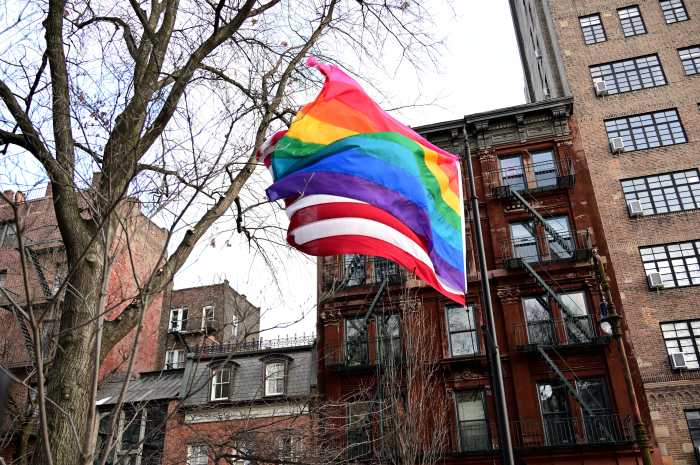BY ARTHUR S. LEONARD | Facing legal questions for which no New Jersey precedent yet existed, Superior Court Judge Francis B. Schultz, on December 13, awarded the father of twin girls conceived through gestational surrogacy sole custody of the two five-year-olds.
That ruling came despite the court having earlier ruled that the surrogacy contract signed ahead of their birth was void as a matter of state law. Schultz’s earlier order found that the gestational surrogate, though not genetically related to the twins, is their legal mother.
The lengthy court battle has separated the father’s husband from his own sister, the gestational surrogate, who has rejected her earlier lesbian identity and now has moral objections to the relationship between her brother and her legal daughters’ biological dad.
In 2005, Donald Robinson and Sean Hollingsworth, then New Jersey registered domestic partners, entered into a surrogacy agreement with Donald’s sister, Angelia Robinson, for her to bear children for them. The parties originally intended that Angelia’s ova would be inseminated with Sean’s sperm so that the children would be genetically related to both men, but in the end an anonymously donated ova was fertilized in vitro and implanted in her. Angelia was a gestational surrogate rather than a traditional surrogate, and has no genetic relationship to the girls.
The couple and Angelia signed a series of agreements in 2005 and 2006 signaling their intent that the girls, when born, would be the legal children of Sean and Donald, and that Angelia did not intend to be a parent. After the girls’ birth in October 2006, she signed a consent agreement authorizing termination of her parental rights and allowing her brother Donald’s adoption of the twins.
Before the adoption took place, however, Angelia ended her same-sex relationship, renewed her conservative Baptist faith in which she and Donald were raised in Texas, renounced homosexuality, and voiced moral objections to the surrogacy arrangement. After visitation disputes arose, she filed suit in 2007 seeking custody.
Donald and Sean counter-sued seeking summary judgment that Angelia could not be deemed the girls’ mother since she lacked a genetic relationship to them. In late 2009, Judge Schultz rejected that motion, finding that under New Jersey law, the surrogacy agreement and Angelia’s consent to the adoption were both unenforceable, and that she was the twins’ legal mother.
Schultz relied on a 1988 New Jersey Supreme Court ruling that found in favor of a traditional surrogate mother who carried her biological child ostensibly on behalf of a couple. The couple argued that this case was different since Angelia was not the genetic mother as the woman in the 1988 case had been, but the judge rejected that, observing that the state high court had placed no significance on genetic relationships, instead focusing on general policy concerns about surrogacy.
The judge acknowledged that courts in some other states had distinguished sharply between traditional and gestational surrogates, but he found himself bound by New Jersey precedent.
Schultz next set for trial what had become a controversy between two legal parents, Angelia and Sean, who are not married to each other. Each of them theoretically has an equal custody claim, and in some circumstances courts will grant joint legal custody. That is really not a viable option, however, when the parties are bitterly hostile to each other.
Schultz’s decision lays out the great complexity of the case, which pitted Sean and David against Angelia and her parents, who share her moral objections to homosexuality. The twins’ racial identity also became a factor in the case. Sean’s mother is white and his father is African-American, and courts normally treat mixed-race children as having “special needs” due to the identity issues growing up in a society that thinks in racial terms. The ability of parents to provide support for them in establishing their own identity becomes an issue to consider.
Both sides presented experts, but the court relied primarily on the views of a third, neutral expert, Dr. Alex Weintrob, who, Schultz wrote, “was passionate about this.” Weintrob “strongly recommended sole custody” for Sean — who married Donald in California during the brief period in 2008 when it was legal there — “and that it be done as quickly as possible.” Weintrob contended it would be harmful to the girls for Angelia to be awarded custody, in light of her attitudes toward homosexuality and her lack of concern for the issues the girls would face as mixed-race children.
The expert found that Sean would be a superior parent in terms of affirming the girls’ identity, and as a stay-at-home parent, with Donald supporting the family, was better able to care for the children than his sister-in-law, who worked full time and would leave the girls in the care of her parents, who are also hostile to their son’s relationship with the twins’ father.
Finding that “the parents’ ability to agree, communicate, and cooperate in matters relating to the children is nonexistent here,” Schultz rejected joint custody. Awarding sole custody to Sean, he granted Angelia visitation rights to maintain her parental relationship with the girls.
The result of this ruling is that the children have two legal parents, Sean and Angelia, and an uncle, Donald, who also happens to be their father’s New Jersey registered domestic partner and California husband, but who has no legal parental relationship to them, even though they consider him to be one of their fathers.
Since Angelia has blocked her brother’s route to a second-parent adoption and New Jersey does not provide for a child having three legal parents, Donald would have no standing to challenge his sister’s custody should his husband Sean become incapacitated or die. The couple’s family relationship, therefore, remains tenuous.
This case presents a cautionary tale for gay male couples interested in having children through a surrogacy arrangement. Doing this kind of a thing in a state such as New Jersey that has no statutory or judicial recognition and enforcement of surrogacy agreements is a risky business, as written agreements may have no weight in a legal dispute. Things are even worse in New York, where a criminal statute condemns surrogacy agreements, both traditional and gestational. By contrast, surrogacy is legally recognized and such agreements are enforced in Connecticut.
Lowenstein Sandler PC represented the fathers, and Harold J. Cassidy represented the mother.


































